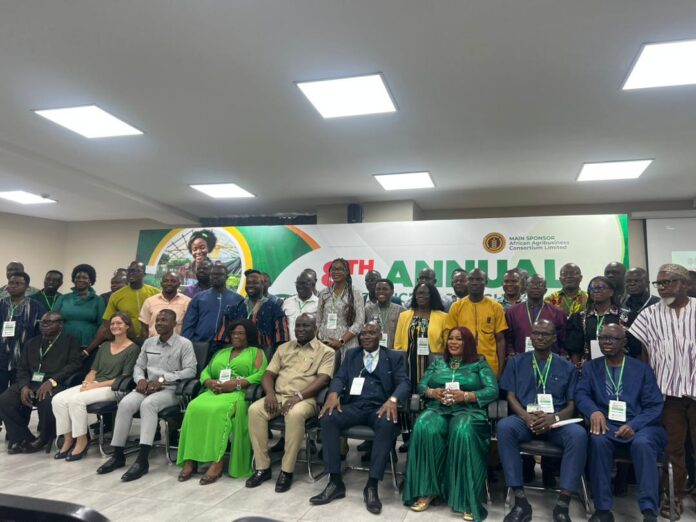The Ghana Association of Agricultural Economists has concluded its 8th Annual Conference with ten (10) recommended solutions to transform the country’s agriculture and food systems.
Helf from 6th to 7th November 2025 at the Kwame Nkrumah University of Science and Technology (KNUST), the conference was under the theme “Transforming Agri-Food Systems in Developing Economies through Sustainable Agribusiness Development.”
It assembled agricultural economists, agribusiness experts, agricultural extensionists, agronomists, postgraduate students from universities, research institutes across Ghana and beyond as well as captains of agribusinesses, young agripreneurs and policy makers.
Over 70 research papers were presented at the conference, covering a wide range of topics including agricultural policy, rural finance and markets, value chain development, postharvest losses, food security, and rural livelihoods, among others.
Practitioners in the industry also exhibited their technologies and products.
The plenary sessions provided an opportunity for researchers, policymakers, and practitioners to share experiences, identify challenges, and propose practical and interdisciplinary solutions for advancing sustainable agriculture and agribusiness in Ghana, across Africa and globally.
Following these discussions the industry players have suggested these solutions to transform the sector.
- Sustainable Cocoa Initiative & the EU Deforestation Regulation (EUDR)
i. Discussants emphasized that the adoption of sustainable cocoa production practices is non-negotiable if Ghana is to maintain its access to premium international markets and protect its natural environment.
ii. However, there is urgent need for empirical data on carbon sequestration across different cocoa farming and cropping systems. Such evidence is essential to guide both policy formulation and field-level practices in line with sustainability and environmental standards.
- Developing Sustainable Agribusiness in Africa
Industry leaders shared valuable lessons from their practical experiences, particularly in building resilient agribusinesses under challenging economic conditions.
i. Young people aspiring to enter the agribusiness space should “dream big, start small, and start now,” by adopting a mindset of innovation and persistence.
ii. Given the limited access to financing from formal institutions, agribusiness start-ups should leverage Other People’s Resources (OPRs) and explore partnerships with established firms.
iii. For long-term sustainability, agribusiness owners in Africa should groom and mentor successors, to ensure smooth business continuity and intergenerational transfer of knowledge.
- Sustainable Agriculture and Food Security
i. There is urgent need to promote climate-smart and ecologically sound agricultural practices to safeguard food security in tropical regions which are increasingly threatened by climate change and food insecurity.
ii. In the face of water scarcity, the Alternate Wetting and Drying (AWD) Technology should be promoted and scaled among rice farmers to improve rice productivity and profitability in Ghana.
iii. The collaboration among researchers, policymakers, and private sector actors should be strengthened to develop and scale up innovative technologies and management systems that sustain productivity, minimize food losses & waste, and improve food security, while conserving biodiversity and soil health.
iv. Private sector operators in the agri-food sector should leverage the expertise of GAAE members to conduct cutting-edge research that offers innovative solutions to the business challenges they face.
A call for Action on the part of Government:
• In addition to providing enabling policy environment, we (GAAE members) call on the government to increase the budgetary allocation (at least 10%) for the agricultural sector to ensure adequate investment in the agribusiness sector to drive the needed transformation in the agri-food system in Ghana.
• Sustainable Agribusiness is critical in achieving the objectives of the Feed Ghana Programme. The Ghana Association of Agricultural Economists (GAAE) stands ready to offer technical support to the programme.
The conference concluded with a renewed commitment from GAAE and its partners to foster evidence-based policymaking, strengthen public–private partnership, and build the capacity of the next generation of agribusiness leaders.
Participants affirmed that transforming agri-food systems through sustainable agribusiness is key to achieving inclusive growth, food security, and environmental sustainability in Ghana and beyond.
Source: Emmanuel Bright Quaicoe



